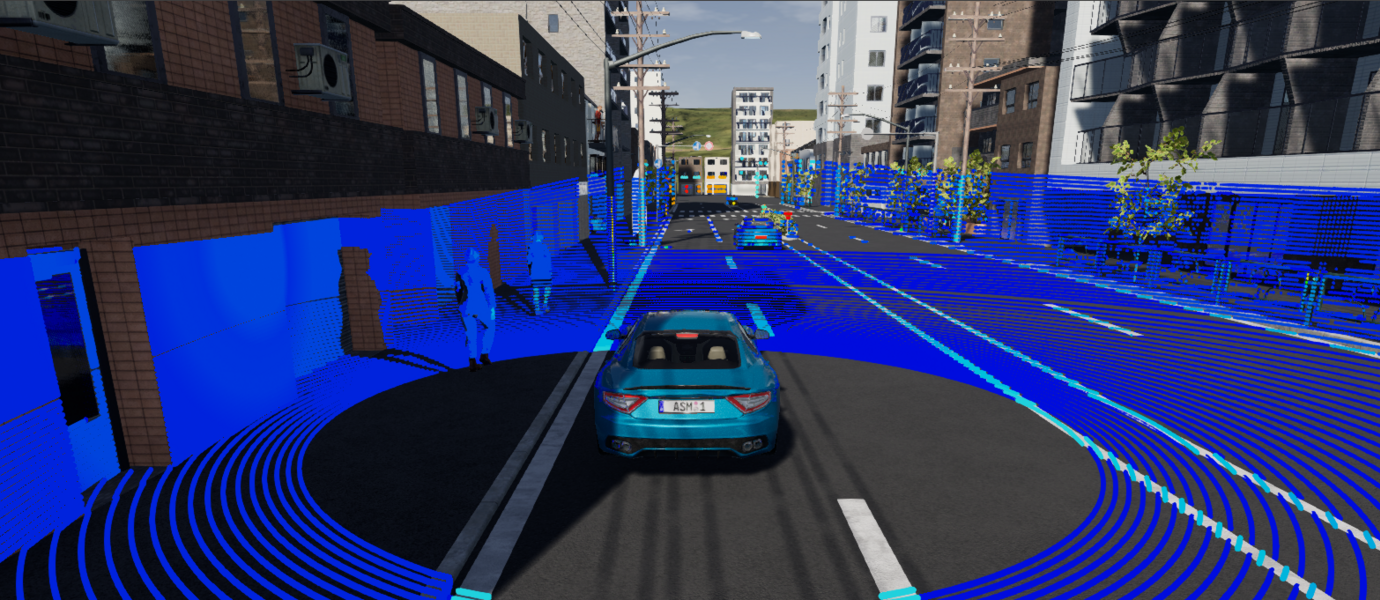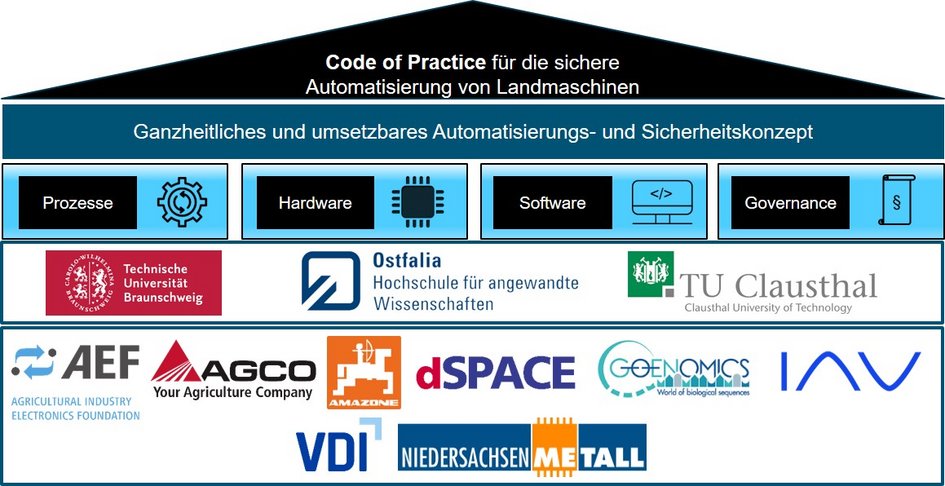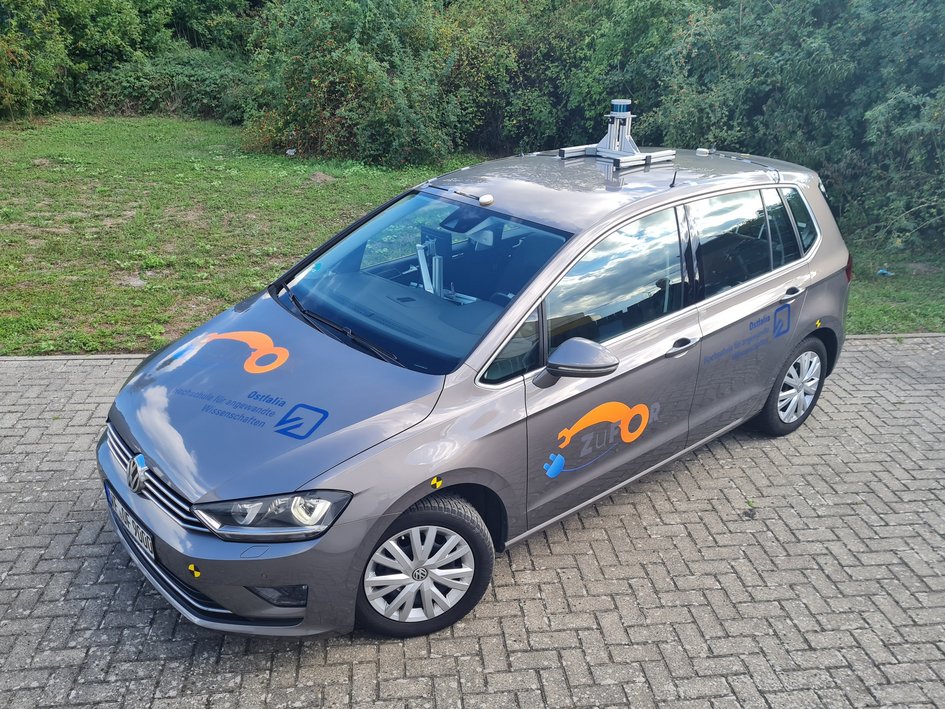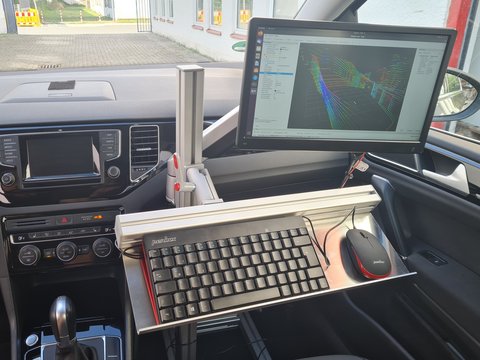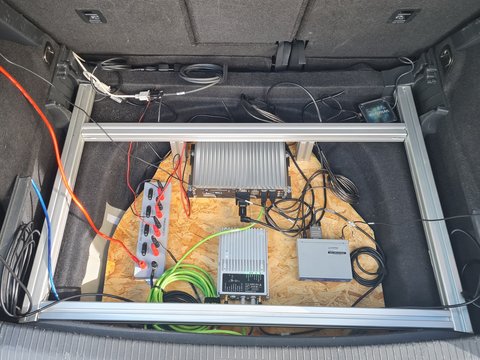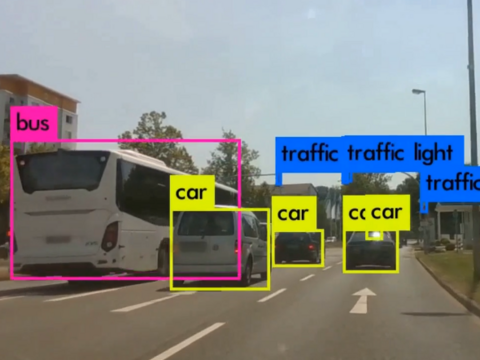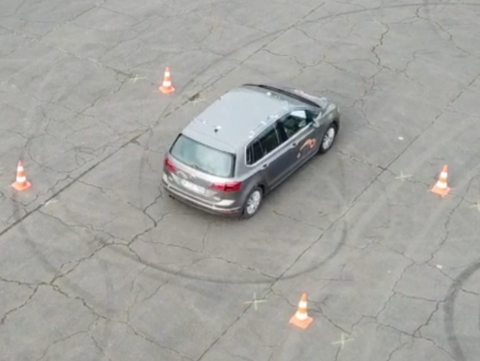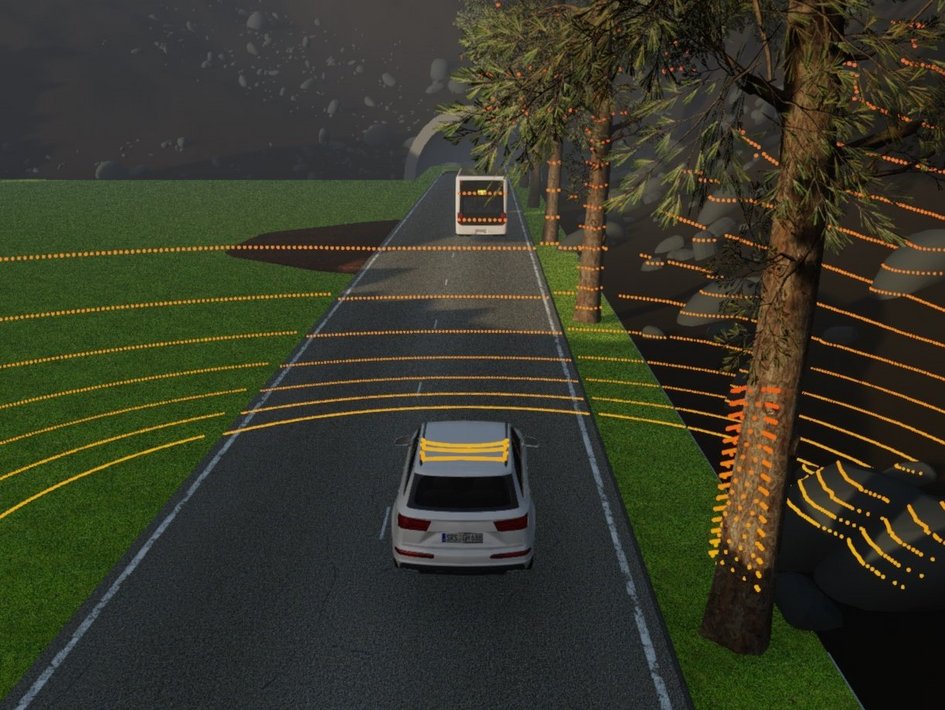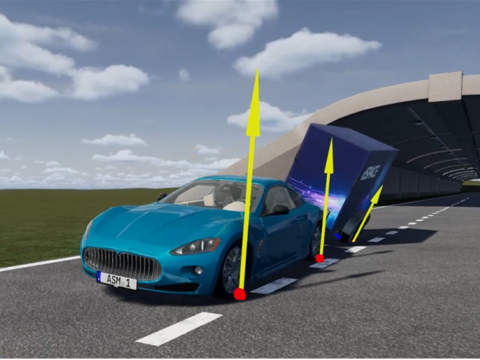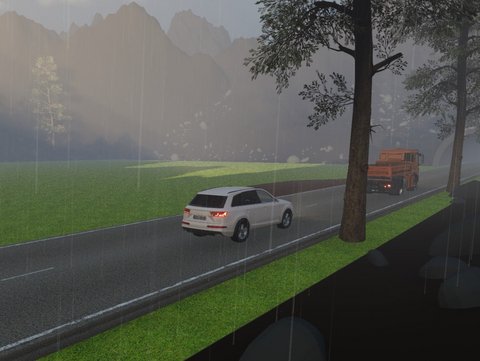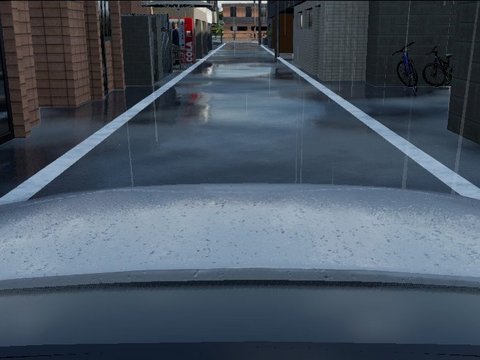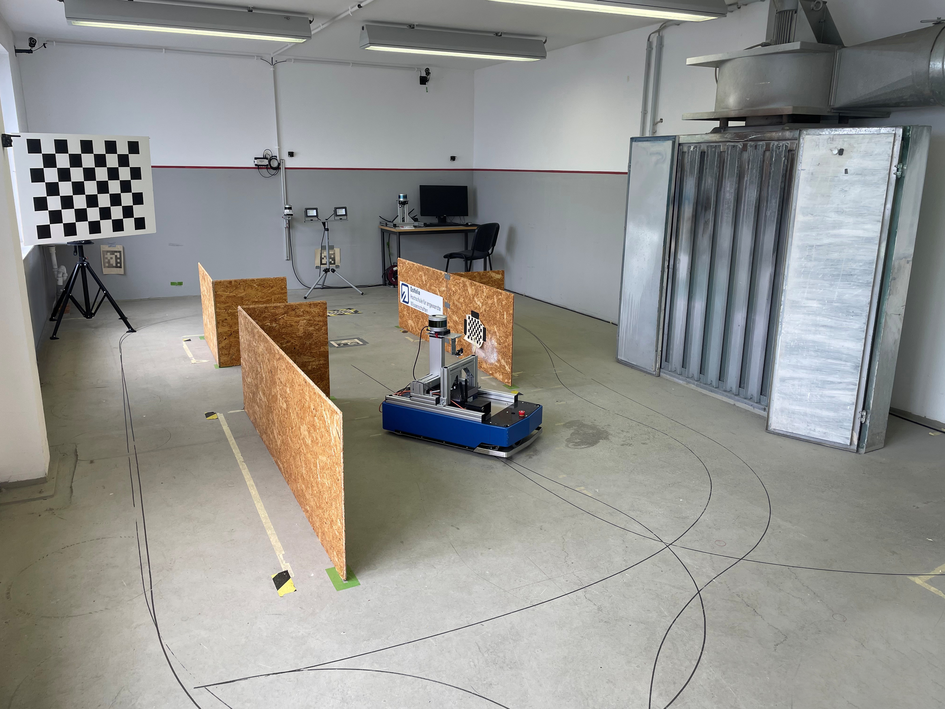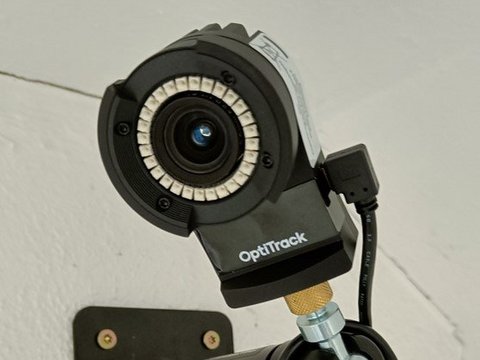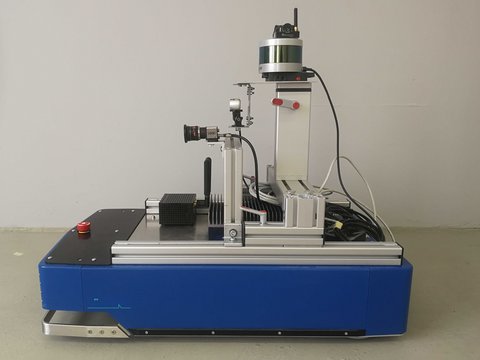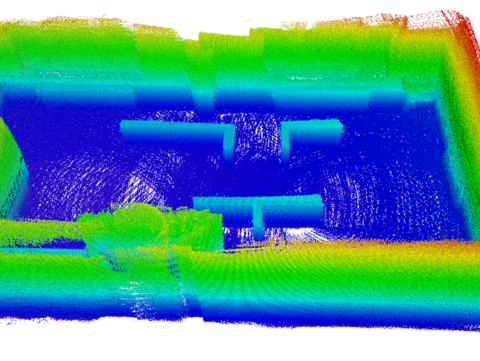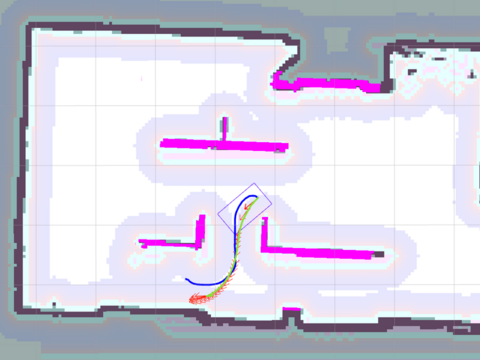Active vehicle safety
Research projects
GESAL
GESAL - Holistic development guidelines for a realisable safety and automation concept for agricultural machinery

Project title:
GESAL - Subproject A - Ostfalia University of Applied Sciences
Holistic development guideline for a realisable safety and automation concept for agricultural machinery: Sensor & hardware safety
Funding:
Innovation by universities and research institutions - innovation networks
European Regional Development Fund (ERDF)
Duration:
01.11.2024 - 31.10.2027
Project volume:
Volume of the sub-project: €874,657.77 (of which €695,234.10 in funding)
Total volume of the innovation network: approx. 2,700,000€
Scientific network partners:
Braunschweig University of Technology
Clausthal University of Technology
Economic partners of the sub-project:
dSPACE GmbH
VDI State Association of Lower Saxony
Project description:
GESAL stands for the creation of a development blueprint that contains a holistic and realisable automation concept for agricultural machinery. This involves a scientifically sound examination of the safety aspects of hardware, software and processes as well as an analysis of the legal framework.
Sub-project A comprises the overall network management in conjunction with a knowledge and technology transfer concept developed during the project as well as the development of safe hardware and sensor architectures for automated agricultural machinery.
For the knowledge and technology transfer of the development blueprint created in the project, new formats are being developed through sustainable media planning in order to communicate the project results to the target group. The focus is on small and medium-sized companies.
On a technological level, the aim is to identify safety-critical scenarios in the use of fully automated and driverless agricultural machinery as such and to use AI-based sensor fusion architectures to reliably recognise and classify obstacles under weather- and process-related disturbance variables. A simulation environment is being designed for this purpose, which forms the basis for function development under realistic conditions. All functionalities are designed on the basis of a specified worst-case scenario and then transferred to less safety-critical applications.
SoFia
SoFia - Safe autonomous cooperative driving in digitalised distribution logistics
Project summary:
In the transdisciplinary research project "SoFia - Safe autonomous cooperative driving in digitalised distribution logistics", an electronic vehicle management system (kiEFM) based on artificial intelligence (AI) is being developed. This enables safe, automated and cooperative driving in distribution logistics. By communicating with other road users and the infrastructure using 5G technology, the intelligent vehicles can exchange information, e.g. about the planned route or obstacles on the carriageway. Similar to the cooperation of human drivers (e.g. through hand signals or direction indicators), this optimises driving behaviour in the entire cyber-physical traffic system. The kiEFM is designed on the basis of a holistic digitalised logistics concept for autonomous shuttle transport, enabling an energy-optimised, efficient and sustainable flow of goods. Specific application examples such as the delivery of baked goods from the production site to various retail outlets are taken into account. Model- and software-based methods are initially used for the virtual development of kiEFM. By identifying and virtually reconstructing safety-critical driving scenarios (e.g. junctions with poor visibility), accident avoidance manoeuvres are derived, which the kiEFM executes independently. By merging environmental sensor data with information from 5G communication and digital maps, the driving safety of the kiEFM is successively increased in an iterative process. By generalising the results and findings obtained, recommendations for action are derived in the form of a roadmap that supports companies in the use of cooperative intelligent vehicles for the digitalised redesign of their shuttle traffic in distribution logistics.
Scientific partners at Ostfalia:
- Prof Dr Xiaobo Liu-Henke, Faculty of Mechanical Engineering
- Prof. Dr Kirsten Wegner, Faculty of Commerce and Social Work
Business partners:
- Bäckerei und Konditorei H. Meyer & Sohn GmbH
- Eggers Landmaschinen GmbH & Co. KG
- Götting KG
- Pepperl & Fuchs GmbH
- Sandmann Innovation GmbH
- VDI Braunschweig District Association e.V.
- Economic development in the district of Harburg GmbH
- Salzgitter Economic and Innovation Promotion GmbH
The project:
- Funding programme: zukunft.niedersachsen
(Call for proposals "Innovation at universities of applied sciences - funding line 2") - Project volume: approx. €560,000 (of which €500,000 in funding)
- Funded by:

WindMate
WindMate - Safe driving in extreme weather conditions for commercial vehicles
Safe driving in extreme weather conditions for commercial vehicles
Ventus Technologies GmbH and the Department of Vehicle Safety at Ostfalia University of Applied Sciences have joined forces in the "WindMate" innovation project to develop a pioneering preventive warning system for strong gusts of wind in road traffic. The new digital assistant is intended to significantly increase road safety for lorries and other commercial vehicles. The project is being funded with around 443,000 euros from the Central Innovation Programme for SMEs (ZIM).
"WindMate" aims to develop a preventive warning and driving assistant that informs drivers before they enter danger zones. Warnings on the vehicle display enable timely speed adjustments or even lane position changes, especially in the context of increasing autonomous driving. In this way, "WindMate" helps to ensure safe road traffic for all road users on stormy days.
Predicting dangerous crosswinds using innovative algorithms
As part of the ZIM project, Ventus Technologies GmbH is developing innovative algorithms that make it possible to precisely calculate the wind maxima closely associated with gusts, taking the terrain into account. This is being done for the first time by integrating high-resolution terrain models with current weather data. The Vehicle Safety Department at Ostfalia University of Applied Sciences is supporting the project by carrying out comprehensive analyses and evaluations of various vehicle categories based on detailed driving simulations. This data forms a library of possible vehicle-weather combinations in order to generate customised warning messages for different vehicles.
Development of a preventive warning and driving assistant
"WindMate" is a preventive safety assistance system that aims to ensure safe driving conditions for commercial vehicles in wind and gust situations that were previously difficult to predict. Compared to other vehicle classes, commercial vehicles have significantly more mass and energy, which is why weather-related accidents are particularly serious. Sudden crosswinds, especially out of town, pose the greatest risk, as many commercial vehicles often transport inadequately secured loads. "WindMate" focuses on local weather effects such as the increased likelihood of gusts, which pose an immediate threat to the safety of lorries and combinations. Current warning measures at bridges, such as wind flags and electronic warning displays, require direct observation and could be issued too late in case of doubt. Official weather warnings are often limited to larger weather situations and regions. The project closes precisely this modelling and warning gap.
The idea for the "WindMate" project was developed as part of the FAKOSI - Comfort and Safety Technologies for Light Electric Vehicles (LEVs) innovation network, which is funded by the Central Innovation Programme for SMEs (ZIM). As part of the membership, the partners are actively supported in the realisation of R&D projects and in securing funding. FAKOSI is managed by IWS GmbH, which also handles the application management for the cooperation projects and provides intensive support to members in the development of new technologies.
Short facts:
Project start: 03/2024
Project partner: Ventus Technologies GmbH
Duration: 30.5 months
Funding volume: €443,000
Funded by:
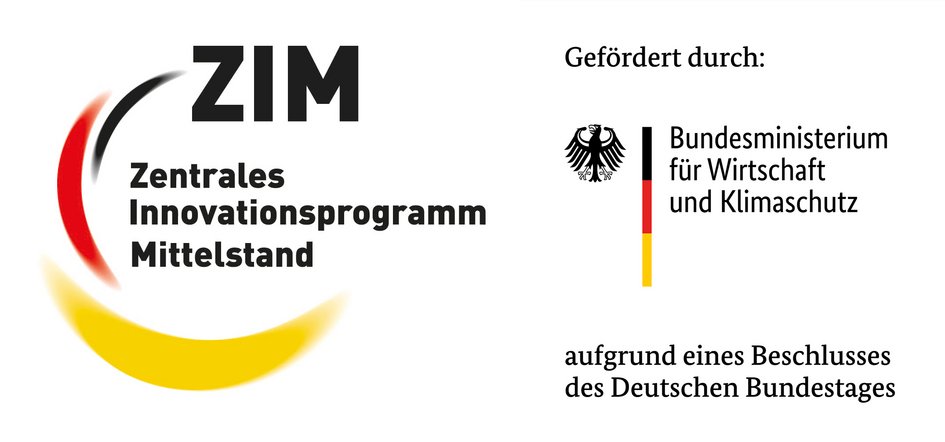
SeLeTraSys
SeLeTraSys - Self-propelled transport system

Term:
01.08.2018 - 31.07.2021
Cooperation partner:
Götting KG, Lehrte
Funding from the state:
European Regional Development Fund (ERDF)
Funding amount:
295.866 €
Field of research:
Intelligent systems for energy and mobility
Project description:
In the production of goods today, driverless transport systems are used in many cases for the internal disposition of components and semi-finished products. On the one hand, the operative organisation of logistics is highly automated and taken over by computer programs and, on the other hand, the human forklift driver is replaced by an electronic vehicle control system.
The subject of this research project is the design and implementation of a transport system that can operate in a highly or fully automated manner without the use of physical auxiliary routes. The focus is on analysing the required sensor technology and the subsequent data fusion of the individual sensor components into an overall image of the environment. In this process, a digital map is created that not only depicts the geometry of the environment but also marks obstacles and areas with a high density of pedestrians. This information is used to individually adapt the route planning of the individual transport vehicles in order to ensure the transport flow and avoid endangering pedestrians through possible collisions.
ZuFor
ZuFor - Future vehicle technologies in the Open Region Lab
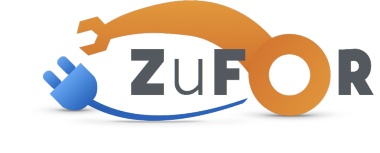
Ostfalia is pursuing two strategic goals with the "Future Vehicle Technologies in the Open Region Lab - ZuFOR" project: Firstly, the important research fields of Intelligent Systems for Energy and Mobility and Vehicle Construction, Plastics and Materials Science are to be further strengthened by three technical research topics from the "Future Vehicle Technologies" specialisation. The second goal is to establish a sustainable and strategic structure with a laboratory character: the Open Region Lab (ORL). As a knowledge hub, the ORL will take up regional, socially relevant and technical impulses.
The project:
- Funding: Niedersächsisches Vorab
(Call for proposals "University of Applied Sciences research as a driver of regional development") - Duration: 01.10.2016 - 31.12.2020
- Funding volume: ~ € 1.4 million
- Promotion of young researchers: cooperative doctorates in sub-projects
- Project management: Prof Dr Gert Bikker
- Project coordination: Gabriele Stiller M.A.
- Partners: Volkswagen AG, Hella KG Hueck & Co., Götting KG
- Funded by:

Development of switchable, integral safety systems
Reducing the number of road accident victims in connection with increasing traffic density and growing urbanisation is an issue of particular social relevance in Europe. With "Vision Zero", the EU has set itself the goal of halving the number of road deaths within 10 years (by 2020). Given the current number of road fatalities, this target does not appear to be achievable, meaning that new systems are required, particularly for private transport and road freight transport, in order to achieve the target of halving the number of road fatalities. In addition to driver assistance systems, networking and automated driving functions, integral safety systems that combine active and passive safety will play a central role here, so that the immediate pre-accident phase in particular is utilised to a greater extent.
Objective
The aim is to develop integral, switchable safety systems that increase occupant protection. In further considerations, future applications and safety elements for innovative vehicle concepts are to be developed and their implementation evaluated through the progress of research.
- Development of integral, switchable safety systems to increase occupant protection
- Development of future applications and safety elements for innovative vehicle concepts
- Definition of design cases
- Determination and evaluation of the safety potential
- Development of innovative systems
- Evaluation of the implementation
FAKOSI Network
FAKOSI - Ride comfortably and safely!
The LFF is a member of the FAKOSI innovation network, which focuses on the development of innovative comfort and safety technologies for light electric vehicles (LEV). The term LEV describes a wide variety of vehicle types below the passenger car class. In addition to two- and three-wheeled motor vehicles and light four-wheeled motor vehicles, the term LEV also includes e-bikes, pedelecs and other pedal-powered vehicles, such as electrically assisted cargo bikes and other vehicle concepts from the field of micromobility such as e-scooters. In order to address specific development needs, FAKOSI combines expertise in manufacturing processes, materials science, lightweight construction, metrology and other scientific and technical disciplines with medium-sized manufacturers and service providers from the fields of machine vision, embedded systems and AI.
The thematic focus "Active safety systems for accident prevention" includes the development of technologies for networked road safety, driver assistance systems (electronic braking systems, integrated tilting technology, active stability control, steering assist), human machine interfaces (HMI) and intelligent protective equipment (helmets, jackets, etc.).
Perception of surroundings and driver assistance systems
Simulation and processing of environmental sensor data
Your cookie settings have blocked this video.
Euro NCAP AEBS Test
Your cookie settings have blocked this video.
Navigation and trajectory planning
Fine positioning function for driverless transport vehicles
Your cookie settings have blocked this video.
Local trajectory planning for driverless transport vehicles
Your cookie settings have blocked this video.
Mobile test vehicle for environmental perception
- Base vehicle: Golf Sportsvan
- Environmental sensors:
- LiDAR Velodyne VLP16
- Camera (mono / RGB-D)
- Measurement technology:
- Genesys ADMA inertial platform (accelerations and rotation rates)
- RTK-GNSS (2x GNSS antennas & 2x GSM correction data antennas)
- Hardware:
- IPC with dual OS (Windows / Linux)
- Stationary workstation with monitor and peripherals
- Vector VN1610 CanLogger
Sensor and driving dynamics simulations
In the AURELION simulation software, sensor-realistic data from LiDAR, camera and radar sensors is generated and visualised in graphical environments. With the help of other software tools, driving processes of the ego vehicle and other road users (e.g. pedestrians, cyclists, cars) are parameterised, executed and visualised in AURELION. In addition, weather-related disturbance variables (e.g. rain, fog, snow) can be integrated into the simulation in order to analyse the sensor behaviour under non-ideal conditions. Areas of application include the validation of general perception functions and driver assistance systems.
Test environment for mobile robotics
Laboratory equipment
- Motion capture reference sensors (position accuracy +/- 0.2 mm; orientation accuracy +/- 0.1°)
- Stationary wide-angle LiDAR (90° vertical FOV, 64 planes) for object detection, classification and tracking
- Devices for generating sensor disturbance variables:
- Fog
- Backlight
- Modular test setups
